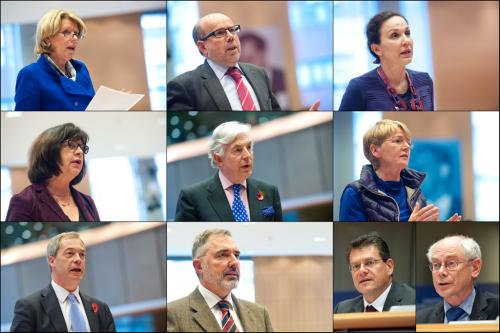Europe after the crisis: MEPs debate the direction for the EU to take
As Europe slowly emerges from the economic crisis, what measures are needed to boost growth and keep Europe on the right track? MEPs debated the issue during a Conference of Presidents meeting on 5 November on the outcome of the Council summit in October, dedicated to economic coordination, data protection, immigration and the digital economy.

(Top from left) Corien Wortmann-Kool, Enrique Guerrero Salom (S&D), Parvanova Antonyia, (middle from left) Rebecca Harms, Geoffrey Van Orden, Gabriele Zimmer, (bottom from left) Nigel Farage, Stadler Ewald, Maroš Šefčovič and Herman Van Rompuy
Council president Herman Van Rompuy highlighted the challenges that remained: “We have left the existential crisis of the euro behind us and that we can now devote all our energy to the wider economic challenges of consolidation, the short term recovery and strengthening our policies and tools for the future.”
Commission vice-president Maroš Šefčovič, commissioner for inter-institutional relations, said boosting the digital single market by 2015 was a priority: “To compete globally we need to boost public and private investment on innovation in the ICT sector.” He also said that youth employment and the youth guarantee were very important for the Commission.
Corien Wortmann-Kool, a Dutch member of the EPP group, said: “We need jobs instead of debt for our citizens. We need structural reforms to enhance competitiveness and economic growth, not tax increases, but structural reforms because only then can our SMEs flourish and provide jobs.”
Enrique Guerrero Salom, a Spanish member of the S&D group, added: "The EU is not in the same situation it was some years ago. It is not in intensive care anymore, but it is still sick. If we do not take the right measures the sickness will become chronic. In that sense the European Commission, the Council and some member states became too complacent."
Migration was discussed by Parvanova Antonyia, a Bulgarian member of the ALDE group, who said that the EU was still not ready for further migration flows: "There must be a follow-up with concrete action and a coherent migration policy."
The summit was called a disappointment by Rebecca Harms, a German member of the Green group. Referring to Lampedusa, she said change was needed: "You were not even able to make one single correction to a common refugee policy."
Geoffrey Van Orden, a British member of the ECR group, welcomed Council discussions on deregulation: “The best way of cutting unhelpful regulation would be to reduce the number of European directorates and bureaucrats. Fewer officials and fewer pet projects means less red tape, more competitiveness and a reduced EU budget – a triple benefit.”
Gabriele Zimmer, a German member of the GUE/NGL group, said very little progress had been made at the summit: "There has been a failure to take decisions on the most pressing issues that required to be resolved. There is a crying lack of action. Little has been done to rectify the errors of the past.”
Nigel Farage, a British member of the EFD group, accused politicians of taking a "dull, technocratic approach" to problems and ignore the reality, which is: "Nothing in this Union is getting any better". He called for referendums in all member states on the existence of the EU institutions.
Stadler Ewald, a non-attached member from Austria, questioned how the EU had dealt with the crisis: "Nothing has been solved: you have simply spent billions of the taxpayers money in buying yourself time."
Source: European Parliament
- 346 reads
Human Rights
Fostering a More Humane World: The 28th Eurasian Economic Summi

Conscience, Hope, and Action: Keys to Global Peace and Sustainability

Ringing FOWPAL’s Peace Bell for the World:Nobel Peace Prize Laureates’ Visions and Actions

Protecting the World’s Cultural Diversity for a Sustainable Future

Puppet Show I International Friendship Day 2020

